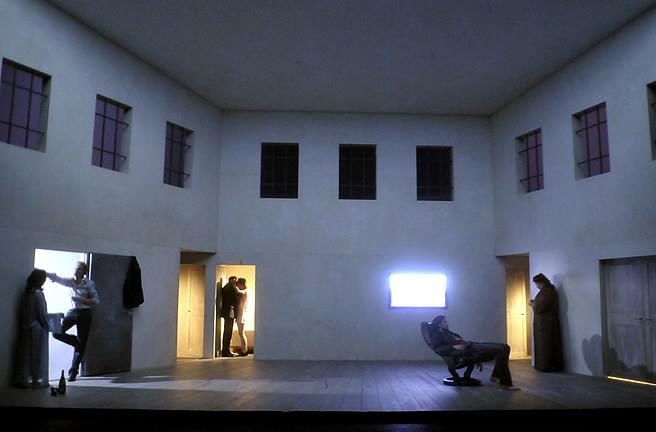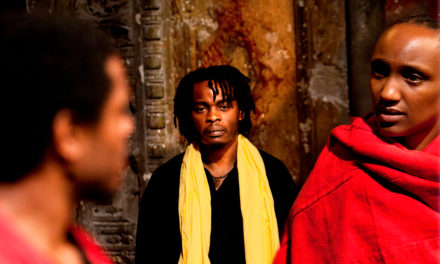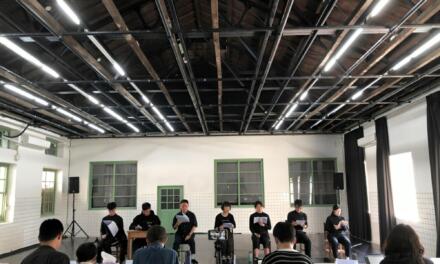The cover image of the January 1986 special issue of Théâtre/Public, “Dramaturgie,” offers a glimpse of what dramaturgy looked like to French theatre scholars and practitioners at the time: a photo of a hand lightly touching a single typewritten piece of paper on a desk, other overturned pages nearby. It is dark. A small lamp illuminates the stack of paper, it is a script. In her preface to this issue that proposed to assess the state of dramaturgy, Michèle Raoul-Davis made the distinction between the “literary side of the dramaturg, the person responsible for the programming and publications for productions,”[i] and “the dramaturg that Jean-Marie Piemme calls the ‘stage dramaturg.’”[ii] Raoul-Davis asserted a mandate to dwell primarily on the latter, as “The utility [of the former] at least in the big theatres, seems evident.”[iii] This distinction between stage dramaturg and literary dramaturg permeated the issue, conversations about dramaturgy at the time, and continues to do so today in definition, theory, and practice. This is amplified by the fact that in French, as in other romance languages, the word for dramaturg, dramaturge, has long meant “playwright.” In her “dramaturgically staged” [iv] interview in Contemporary Theatre Review, in which she edits and arranges excerpts from interviews with several dramaturgs and one playwright, British scholar Clare Finburgh argues that the terms “dramaturgy” and “dramaturg” remain “diverse and unresolved”[v] in France in 2010. My purpose here is a 2013 examination of the evolution of French dramaturgy, and to ask when and how French theatre developed its own unique practice of dramaturgy. Tracking the status of the French dramaturg is not only compelling for the story of dramaturgy in France but also illuminates key moments in French theatre history.
Jacques Scherer’s 1950 book, La Dramaturgie Classique En France (Classical Dramaturgy in France)[vi], is a detailed study of dramatic technique through close readings of plays and marks the beginning of a discourse around contemporary French dramaturgy. While others had written extensively about the playwrights he considers—including d’Aubignac, Molière, and Corneille—Scherer’s innovation was to isolate and analyze the elements of dramatic structure and to call this approach dramaturgy. In the 2004 Dictionnaire du Théâtre [vii], Patrice Pavis provides three definitions of dramaturgie; here, Scherer, a literary scholar, employs the word dramaturgie in its first sense: “the art of the composition of plays.’”[viii] Scherer’s methodology reflects the ongoing dominance of Aristotelian and Corneillian dramatic theories and the lingering reign of neoclassicism.
In French theatre, the early fifties saw the advent of the movement later called Theatre of the Absurd or le nouveau théâtre, and, in 1954, the Berliner Ensemble’s first visit to France. During this time of reconsideration of dramatic structure and language, “dramaturgy” became a way to talk about the plays themselves in rehearsal and on stage. A few individuals emerged who called themselves dramaturgs, including Brecht translator Maurice Regnaut, whom Jean Jourdheuil notes as “the first dramaturg in France who actually went by that name.”[ix] With Brecht’s arrival, dramaturgy emerged as an active part of theatre production, and for the first time, dramaturgy became a practice, named as such, in French theatre.
This new role of the French dramaturg was that of an intellectual who specialized in critical thinking and often worked as a translator and writer. The Dictionnaire du Théâtre defines this idea of dramaturgie: “Dramaturgy, activity of the dramaturg (second sense), consists of putting in place textual and scenic materials, to unpack complicated significations of the text and to choose a particular interpretation, to orient the spectacle in the chosen sense.”[x] Still, Finburgh writes, “dramaturgy in France existed as a function before it existed as a profession.”[xi] While Brecht popularized dramaturgy, and some went on to use the title of dramaturg, his visit to France sparked more so the idea of dramaturgy as a mode of thinking, rather than an artistic practice.
Early French dramaturgs provoked some skepticism, particularly since they were primarily philosophers and academics instead of trained theatre practitioners. Michèle Raoul-Davis noted in 1986, “One of the main reasons why production dramaturgs are sometimes seen poorly, badly resented by certain actors … is, I think, because . . . they appear as the intellectual among the artists, and in a position of power in the creative team. It seems to me that many theatre people in France have a very angry complex about the University.”[xii] A link between dramaturgy and a political bent in theatre—what Bernard Chartreux calls when “dramaturgy also immediately put a political flag in its pocket”[xiii]—is a refrain in reports from French dramaturgs of this period. Bruno Tackels recalls that the dramaturg was seen as “a Janus-faced figure who brought intellect that was no doubt valuable, but that could quickly become authoritarian. So the reputation for steering a production in a specific political direction led to dramaturgs having a reputation for controlling.”[xiv] Joseph Danan notes that:
From the start, the relationship between French theatre and the dramaturg was never simple and was, to my mind, marked by what I’d call failure. The problem was that the French imported what they thought to be the Brechtian conception of dramaturgy. The first dramaturgs … turned Brecht’s theories into a doctrine, into what in France we call ‘Brechtism’ – a term that’s now an insult. … Dramaturgs seemed to be employed with the remit of conceiving and imposing a specific political line.[xv]
He recounts that during this time, director “Antoine Vitez called dramaturgs les flics du sens—‘the meaning police.’”[xvi]
The events of May 1968 signaled an upheaval on all levels of French society—from politics to theory to cultural production. Dramaturgy evolved as theatre-makers experimented with innovative collaborations, international inspirations, and new ideas about the role of theatre in society. Raoul-Davis notes in an interview with Jean-Marie Piemme, “It is always said that the twentieth century is the century of directors. It’s certainly not by accident that work with dramaturgs developed in France following ‘68.”[xvii] Major directors like Antoine Vitez, Roger Planchon, and Patrice Chéreau worked with dramaturgs in some capacity, even if the word “dramaturg” wasn’t consistently or officially employed. Jean Jourdheuil, who worked as a dramaturg between 1968 and 1974, proposes, “From 1968 onwards in France, the dramaturg was to constitute an element of disruption, … Dramaturgy for me involved not simply the elucidation of the text, but an attempt at thinking, with respect to the play we were creating, about the politically transformatory potential of theatre. We heralded the advent of a ‘new theatre’ similar to those initiated by Lessing or Brecht.”[xviii]
By the 1980s, the split between the dramaturgs of the page and stage was more clear, as was an ongoing division between the German tradition, and a new particular French practice. By the 1986 Théâtre/Public dramaturgy issue, the revolutionary mandate of French theatre had waned, the théâtre populaire movement had taken off, and the visionary director-centered theatre of Planchon, Chéreau, Vitez, and Ariane Mnouchkine reigned. Dramaturgs now worked in a variety of capacities in major dramatic centers, operas, universities, and even the Comédie Française.[xix] Bernard Dort, who worked at the Théâtre National de Strasbourg, started his first dramaturgy course at the National Dramatic Conservatory in 1981. He notes that dramaturgy is not really a function, but a way of thinking about text and scenic practice; he writes of “a dramaturgical state of spirit, meaning, a certain attention to modalities of passage from the text to the stage.”[xx] For Dort, what is more important is “To ask questions, in the practice itself, of what is being represented? What does it mean to play a text? That’s what I would like to call my dramaturgical vocation.”[xxi] Michel Bataillon’s 1985 lecture in Lyon, reprinted in the same journal, remarks “Dramaturgy is born of reading, or of the work of studying, or of inspiration. Dramaturgy takes shape on the stage, is material, is sensual.”[xxii] After a pigeon-holing of dramaturgy as intellectual practice aligned with Brecht, in the 80s a redefinition for a more fluid, expansive notion of the profession emerges.
What follows Dort’s opening essay in Théâtre/Public is a three-part series of conversations about the state of the profession. In a continuation of France’s look towards Germany on this subject, a full quarter of the issue is devoted to interviews with German dramaturgs and directors, including Peter Stein and Heiner Müller, about German dramaturgy history and practice. In his interview, “L’avocat de l’auteur” [the author’s advocate], Wolfgang Wiens introduces the idea of a “dramaturgie de production” (production dramaturgy). The following two sections instigate a discussion about dramaturgy in France. In “Le ‘dramaturge’,” Michel Bataillon, Bernard Chartreux, Jean-Pierre Vincent, Daniel Besnehard, and Jean-Marie Piemme discuss their visions of French dramaturgy. Piemme proposes the idea of the dramaturge de plateau, or stage dramaturg, the phrase that will come to define contemporary production dramaturgy.[xxiii] Piemme defines this simply: “For me, dramaturgy is an activity of transformation. It consists of transforming ambient conceptual knowledge into a tool that serves actors, directors, and scenographers. It’s an extremely specific activity, and shouldn’t be confused with university research activity.”[xxiv] Finally, Antoine Vitez, Emile Copfermann, Christian Drapon, and Gérard Lépinois ask, “What good is a dramaturg?” As articulated in Théâtre/Public, a major leap forward for French dramaturgy emerges in terms of its definitions, clarification of major trends and figures, and public prominence. That all of the dramaturgs interviewed are men reflects the ongoing male dominance of French theatre at this time; the only woman cited is dramaturg Michele Raoul-Davis, who edited the issue and wrote the introduction. In 2006 and 2009, Théâtre/Public published special issues on la dramaturgie; the journal is a leader among French publications in an ongoing discussion about the practice and profession.
If the 1986 Théâtre/Public gives a state of the profession at that key moment, Anne-Françoise Benhamou’s July 2012 Dramaturgies de plateau (Stage Dramaturgies) offers one of today. Benhamou is perhaps France’s best-known contemporary dramaturg to work in a collaborative, practical model based on a longstanding artistic partnership with a director. From 1993 to 2012, she worked with director Stéphane Braunschweig, current artistic director of Paris’s Théâtre National de la Colline. After writing her dissertation with Dort, Benhamou began her career as a professor in 1990 at the Institut d’Etudes Théatrales at Sorbonne and moved to the Ecole Normale Supérieure in 2012. Like many French dramaturgs, she works as both scholar and practitioner and founded and edited the theatre journal Outre Scène. In 2001 she helped found France’s first dramaturgy training program, at the École Supérieure d’Art Dramatique du Théâtre National de Strasbourg, where dramaturgy is offered in tandem with directing training. She directed this program from 2001-2008.
Dramaturgies du Plateau traces her work with Braunschweig since 1992, giving particular in-depth discussions to plays on which the two of them worked, from classics including The Cherry Orchard and Tartuffe, to operas, to projects at the Théâtre National de Strasbourg theatre school. These discussions include notes, letters to Braunschweig and others, and thoughts recorded during rehearsals for different productions; in this way, Benhamou introduces a French collection somewhat akin to American Mark Bly’s The Production Notebooks—a rare glimpse into the thought processes behind particular productions. Her substantial introduction offers her contemplations on the profession, beginning with the provocation that “We must be able to stop saying the theatre. And instead, the dramaturgy.”[xxv] She advocates for a practice that is both artistic and critical, and defines dramaturgy: “It’s this process of contamination of thought by action, and its reciprocation, that I call stage dramaturgy.”[xxvi]
One of Benhamou’s mandates is, through her book title and professional title, to question the terms dramaturge and dramaturgie. This is clear in her comments at a 2008 roundtable at the Ecole Normale Supérieure de Lyon:
If I am not called dramaturg in the programs, even if I am doing dramaturgy, it’s because we are all doing dramaturgy. It would be, from our point of view, kind of absurd to say that someone is a dramaturgy specialist. If there is dramaturgy in Stéphane Braunschweig’s productions, and there is, it’s because it’s a common terrain for all of us: the costume designer makes dramaturgy in his proposals, the lighting designer too, and of course the actors. There’s no reason to ascribe it to one person, and I’ll add that it would be impossible to do dramaturgy as I do if the director didn’t have the head of a dramaturg….. It’s for that reason that I chose, from the beginning of my collaboration with Stéphane, the title of artistic collaborator.”[xxvii]
Also, a part of the roundtable was Joseph Danan, writer, dramaturg, and professor at the Insititut d’études théâtrales at the Sorbonne, where he teaches a course called “Dramaturgical questions.” Alongside Benhamou, he is one of the best-known contemporary French dramaturgs. In several essays in the mid-2000s, he proposed some of the ideas that would shape his 2010 book Qu-est Ce Que La Dramaturgie? (What Is Dramaturgy?) In his 2005 interview with Christian Biet, Danan, continuing the split proposed in Théâtre/Public twenty years earlier, takes care to divide dramaturgy into two different meanings: “We know that the word dramaturgy has grosso modo two senses. In its first, it designates what we call less and less ‘the art of dramatic composition.’ In its second sense, dramaturgy means this other practice, that considers the conditions of putting onstage a theatre text, in this, it is very close to directing.”[xxviii] Calling the dramaturg “the ghost that haunts the theatre,”[xxix] Danan discusses the emergence of stage dramaturgy, and the idea of the dramaturg as a stand-in for the audience:
Then, we saw appear, at the end of the 1970s, stage dramaturgy. What the dramaturg was reading, thus, was not just the text, but the production. He became the first reader of the signs proposed by the stage, … this type of dramaturgy avoids fixing one preconditioned reading of the stage work, and elaborates the reading based on scenic practice. So, the position of the dramaturg is one of someone who doesn’t direct the work, but is the first ‘audience member,’ the first spectator facing the stage.[xxx]
Danan stresses that as opposed to the earlier model of the dramaturg imposing a particular viewpoint, this conception of the dramaturg is one premised on invisibility: “The dramaturg is invisible by excellence, even more than the director . . . The dramaturg is invisible and the dramaturg is herself the invisible dimension of the production.”[xxxi] In his 2006 essay of the same title, Danan asked if we have reached the End Of Dramaturgy? [xxxii] He remarks that with the advent of postdramatic theatre, the textual basis of French dramaturgy has been upended: “There is today a clear crisis in dramaturgy in its first sense—a crisis that Hans-Ties Lehmann radicalizes as part of ‘postdramatic theatre.’”[xxxiii]
As they attempt to unpack and situate the state of French dramaturgy today, both Benhamou and Danan locate themselves in a lineage of theatre history. Benhamou notes, “Brecht and critical theory then continued to be dominant forces in the theatres of successive generations of French directors such as Vitez and Patrice Chéreau, who had trained with Planchon, and also with Giorgio Strehler, who had introduced Brecht to Italy in the same way that Planchon had introduced him to France. Then, Braunschweig, for whom I’m dramaturg, worked with Vitez, and he continues the tradition of incorporating critical theory into mise en scène today.”[xxxiv] Danan writes, “André Antoine distinguished, in directing, a material and an immaterial dimension, and Dort said that directing and dramaturgy were ‘two sides of the same activity.’”[xxxv] Bruno Tackels finds the practice fluid and even omnipresent, though warns of lingering mistrust of the specific vocabulary of practice and practitioner: “Therefore, I am not saying dramaturgy doesn’t exist in France; on the contrary, many people perform the function of dramaturg, but the term itself has become taboo for reasons I’ve explained.”[xxxvi] For dramaturgy in France today, Bernard Dort was prescient in his 1986 comment: “The word ‘dramaturgy’ has multiple accepted uses. These reflect the evolution of theatre practice. But they are less different than they seem.”[xxxvii] While there are multiple definitions for it, dramaturgy in France remains an ongoing profession and tradition that reflects flashbulb moments in French theatre history.
The original version of this article was published in The Routledge Companion to Dramaturgy. Reposted with permission.
[i] With the exception of quotes from Finburgh’s essay, all French-English translations are my own.
[ii] Michèle Raoul-Davis. “Profession ‘dramaturge.’” Théâtre/Public. January/February 1986. Théâtre de Gennevilliers. 4-6. Page 4
[iii] ibid.
[iv] Clare Finburgh. “External and Internal Dramaturgies: The French Context.” Contemporary Theatre Review. Vol. 20 (2) 2010. 203-213. Page 203. An excerpt from this interview is reprinted in Finburgh’s collection Contemporary French Theatre and Performance, co-edited with Carl Lavery. Palgrave MacMillan. 2011.
[v] Finburgh. 203
[vi] Jacques Scherer. La Dramaturgie Classique en France. Paris: Nizet. 1950.
[vii] Patrice Pavis. Dictionnaire du Théâtre. Paris: Armand Colin. 2004.
[viii] Pavis, 106.
[ix] Finburgh, 205.
[x] Pavis, 106.
[xi] Finburgh, 205.
[xii] Raoul-Davis 5
[xiii] Bernard Chartreux et Jean-Pierre Vincent “Celui qui est dehors tout en étant dedans.” Théâtre/Public. Théâtre de Gennevilliers. January/February 1986. 42-48. page 47.
[xiv] Finburgh. 207.
[xv] Finburgh 207
[xvi] Ibid.
[xvii] Jean-Marie Piemme. “Une activité de regard.” Théâtre/Public. 52-58. 56.
[xviii] Finburgh, 206
[xix] Jean-Pierre Vincent worked as dramaturg at the Comédie Française.
[xx] Bernard Dort, “L’était d’esprit dramaturgique.” Théâtre/Public. 8-13. page 8.
[xxi] Dort, 12.
[xxii] Michel Bataillon. “Une connivence fluide et aléatoire. Théâtre/Public. 39-41. 41.
[xxiii] Jean-Marie Piemme. “Une activité de regard.” Théâtre/Public. 52-57. Page. 52.
[xxiv] Piemme, 54.
[xxv] Anne-Françoise Benhamou. La Dramaturgies de plateau. Besançon: Editions Les Solitaires Intempestifs. 2012. Page 15.
[xxvi] Benhamou, 11.
[xxvii] Dramaturges et Dramaturgie. Table ronde. Ecole Normale Supérieure dy Lyon. Organized by Marion Boudier and Sylvain Diaz. 29 January 2008. Transcript at: http://agon.ens-lyon.fr/index.php?id=1049
[xxviii] Entretien avec Joseph Danan, page 619.
[xxix] Danan interview 2005 p 619
[xxx] Danan interview ghost p. 625.
[xxxi] Danan ghost interview p 626
[xxxii] Joseph Danan. “Fin de la Dramaturgie?” Frictions: théâtres_écritures. Montrouge: Frictions. 2006. 46-51.
[xxxiii] Christian Biet. “Entretien avec Joseph Danan: Le dramaturge, ce spectre qui hante le théâtre.” Critique: Le théâtre sans illusion.” Paris: Les Editions de Minuit. August/September 2005. 619-626. Page 620.
[xxxiv] Finburgh, 205
[xxxv] Danan, 626
[xxxvi] Finburgh, 207.
[xxxvii] Dort “L’état d’esprit dramaturgique,” 8
This post was written by the author in their personal capacity.The opinions expressed in this article are the author’s own and do not reflect the view of The Theatre Times, their staff or collaborators.
This post was written by Kate Bredeson.
The views expressed here belong to the author and do not necessarily reflect our views and opinions.


















